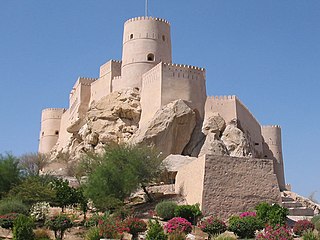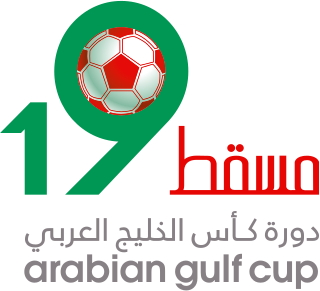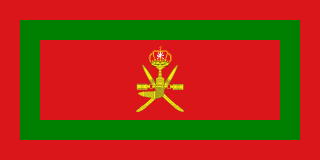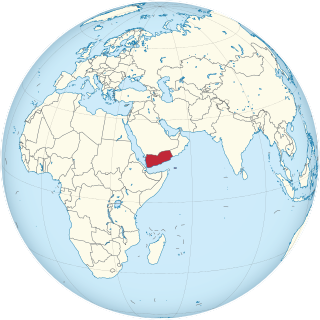
Oman, officially the Sultanate of Oman, is a country on the southeastern coast of the Arabian Peninsula in Western Asia. Formerly a maritime empire, Oman is the oldest continuously independent state in the Arab world. Located in an area bordering the mouth of the Persian Gulf, the country shares land borders with Saudi Arabia, United Arab Emirates, and Yemen, and shares maritime borders with Iran, and Pakistan. The coast is formed by the Arabian Sea on the southeast, and the Gulf of Oman on the northeast. The Madha and Musandam exclaves are surrounded by UAE on their land borders, with the Strait of Hormuz and the Gulf of Oman forming Musandam's coastal boundaries. Muscat is its capital and largest city.

Oman is the site of pre-historic human habitation, stretching back over 100,000 years. The region was impacted by powerful invaders, including other Arab tribes, Portugal and Britain. Oman once possessed the island of Zanzibar, on the east coast of Africa as a colony. Oman also held Gwadar as a colony for many years.

Muscat is the capital city and is the most populated city in Oman. It is the seat of the Governorate of Muscat. According to the National Centre for Statistics and Information (NCSI), the total population of Muscat Governorate was 1.4 million as of September 2018. The metropolitan area spans approximately 3,500 km2 (1,400 sq mi) and includes six provinces called wilayats. Known since the early 1st century AD as an important trading port between the west and the east, Muscat was ruled by various indigenous tribes as well as foreign powers such as the Persians, the Portuguese Empire, the Iberian Union and the Ottoman Empire at various points in its history. A regional military power in the 18th century, Muscat's influence extended as far as East Africa and Zanzibar. As an important port-town in the Gulf of Oman, Muscat attracted foreign tradesmen and settlers such as the Persians and the Balochis. Since the ascension of Qaboos bin Said as Sultan of Oman in 1970, Muscat has experienced rapid infrastructural development that has led to the growth of a vibrant economy and a multi-ethnic society. Muscat is termed as a Beta - Global City by the Globalization and World Cities Research Network.

Qaboos bin Said Al Said was the Sultan of Oman from 23 July 1970 until his death in 2020. A fifteenth-generation descendant of the founder of the House of Al Busaid, he was the longest-serving leader in the Middle East and Arab world at the time of his death.

Sultan Qaboos University, located in Al Khoudh in the Muscat Governorate, is the only public university in the Sultanate of Oman.
Luwati is an Indo-Aryan language spoken by 5,000 to 10,000 people known as the Lawatiya in the country of Oman. In total it has been estimated there are 20,000 to 30,000 Lawatiya people. Despite the various names, the Lawatiya refer to the language as Khojki. It is considered an endangered language because a portion of the Lawatiya do not speak Luwati, and it is not continuously passed down to younger generations.

The 19th Arabian Gulf Cup was the nineteenth edition of the biannual Gulf Cup competition, and took place in Muscat, Oman, from 4 to 17 January 2009 and was won by Oman for the first time in its history, in a penalty shootout against regional rivals, Saudi Arabia.

This page list topics related to Oman.

Omanis are the nationals of Oman. Omanis have inhabited the territory that is now Oman. In the eighteenth century, an alliance of traders and rulers transformed Muscat into the leading port of the Persian Gulf. Omani people are ethnically diverse; the Omani citizen population consists of many different ethnic groups. The majority of the population consists of Arabs, with many of these Arabs being Swahili language speakers and returnees from the Swahili Coast, particularly Zanzibar.

The House of Busaid, also known as Al Said dynasty, is the current ruling royal house of the Sultanate of Oman, and former ruling royal house of the Omani empire, Sultanate of Muscat and Oman and the Sultanate of Zanzibar. It was founded by Ahmad bin Said al-Busaidi, ruler of Oman and its east African territories at the time.

Sayyid Badr Albusaidi is the Foreign Minister of Oman. Sayyid Badr has represented Oman in regional and international meetings, which include the United Nations.

Women in Oman now pursue careers and professional training, moving from their previous and traditional role at home to the public sphere. In Oman, 17 October is celebrated every year as the Omani Women's Day with various pro-female events.

The WHO Regional Office for the Eastern Mediterranean is the regional office of the World Health Organization that serves 22 countries and territories in the Middle East, the North Africa, the Horn of Africa and Central Asia. It is one of the WHO's six regional offices around the world.

The National & Gulf Center for Evidence Based Health Practice has been established with the initiative of Bandar Al Knawy, Chief Executive Officer of National Guard Health Affairs, and with the support of former chief executive, Abdullah bin Abdulaziz Al Rabiah in March 2004. The center is recognized by the Cooperation Council for the Arab States of the Gulf Ministers of Health as a reference to evidence-based medicine (EBM) in Saudi Arabia and the Cooperation Council for the Arab States of the Gulf (GCC). The center is an affiliated center to Evidence Based Clinical Practice Group in McMaster University, Canada. This group is led by Gordon Guyatt. It is also a collaborating centre to The Joanna Briggs Institute for Evidence Based Health care, in the University of Adelaide, Australia. The center works in contact, coordination and collaboration with the National EBM committee, GCC Ministers of Health Executive Office, Arabian Gulf University EBM Center, Bahrain, University of Sharjah EBM center, United Arab Emirates, and Sultan Qaboos University EBM Center, Oman.

Haitham bin Tariq Al Said is the Sultan of Oman. Prior to becoming sultan, he served for multiple decades in the Cabinet of Sultan Qaboos bin Said, his cousin. He was Minister of Heritage and Culture from 2002 to 2020. Sultan Qaboos named Haitham as his successor in his will, and he was proclaimed sultan on 11 January 2020, hours after Qaboos's death.

An outbreak of cholera began in Yemen in October 2016, and is ongoing as of November 2021. The outbreak peaked in 2017 with over 2000 reported deaths in that year alone. As of November 2021, there have been more than 2.5 million cases reported, and more than 4,000 people have died in the Yemen cholera outbreak, which the United Nations deemed the worst humanitarian crisis in the world at that time. However, the outbreak has substantially decreased by 2021, with a successful vaccination program implemented and only 5,676 suspected cases with two deaths reported between January 1 and March 6 of 2021.

Al Makassed Hospital is a Palestinian Arab hospital of the Makassed Islamic Charitable Society, one of six hospitals in the East Jerusalem Hospitals Network. It has 250 beds and is situated on Mount of Olives in East Jerusalem. It serves as a tertiary referral hospital mainly for the Arab population of the Palestinian territories, namely the West Bank and the Gaza Strip, but also provides health care for the Israeli population when they meet obstacles using other facilities. It is a teaching hospital of Al-Quds University Faculty of Medicine.

Ahmed Faraj Abdullah Al-Rawahi, commonly known as Ahmed Al-Rawahi, is an Omani footballer who plays for Al-Nasr Club in the Oman Professional League.
Zafarullah Mirza is a Pakistani politician who served as a Special Assistant to the Prime Minister for Health. He was appointed by Prime Minister Imran Khan on 23 April 2019.

Hilal bin Ali bin Hilal Al-Sabti was born on October 27, 1972. He is the Executive President of Oman Medical Specialty Board (OMSB), since May 2015, under Royal Decree No. 24/2015. Hilal is a Senior Consultant Cardiothoracic Surgeon at Sultan Qaboos University Hospital (SQUH).
















